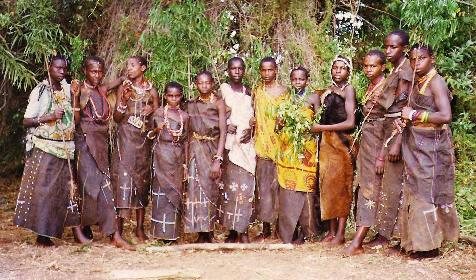
NEWS 2012
africanperspectivesblog
/ October
23, 2012
The
need to protect the environment through conservation of forests is more
appreciated today than ever and so is the need to redress injustices caused by
conservational policies and practices.

Members
of an Ogiek community (Kenya, 2012). Photo credit: Leonard Mindore
The
Ogiek of Eastern Mau Forest filed a civil application in 1997 against the then
Kanu government, HCC/635/97. The case is due for hearing on 6th November 2012.
Members
of the community are asking for support in raising bus fares to Nairobi. One
ticket to and from Nairobi costs KSh 1 200. They are also facing
difficulties in raising the legal fees for the lawyer.
Please
contact us on afriperspectives@gmail.com to receive further
details if you are willing to support.
Donations
can be collected via PayPal and/or transferred via mPesa and/or Western Union.
It
will now depend on how much we can raise as to how many Ogiek can come to
Nairobi to defend their forest in court …
The
Ogiek are an indigenous forest dwelling community. They number more than
Thirty Thousand (30,000) with a strong population of 11,000 adults. Their home
is the Mau Forest complex, a very vital ecosystem that supports lives of more
than 10 Million Kenyans. The Mau forest complex is the largest indigenous
forest left in Kenya -as big as forest of Mt. Kenya and Aberdares combined of
the five major “water towers” and it’s the most important. Some 30
million people depend on water sources originating from Mau – in Kenya and
beyond. Besides being the traditional home of the Ogiek people, it nurtures
trees used by communities and the nation. It feeds 12 major rivers, which
provides water for Millions of Kenyans, in both rural and urban areas. The
river serves six major lakes, namely, Nakuru, Victoria, Baringo,
Turkana,Naivasha and Natron Its destruction means that the ground water does
not absorb nor filter water well, imperiling these rivers, lakes, the Maasai
Mara reserve and even Serengeti. Its cooling action of millions of trees,
carbon dioxide absorption helps to moderate effects of climate change it helps
maintain the climate necessary for tea and other major crops. MFC supports key
economic sectors in Rift Valley, Western and Nyanza provinces, particularly
agriculture and tourism. The estimated potential Hydro-Power generation is
over 500 Megawatts – more than 40% of the total electrical generating
capacity of Kenya today.
Despite
the Ogiek community being recognized as an Indigenous minority forest
community, neither they nor their representative institutions took steps to
accept the challenges of the effects caused by forest degradation and
destruction to their lives and property. Being passive in Rehabilitation and
Restoration of their Mau Forest, though their only home, and in which for
environmental reasons have managed to rally support from local to national and
international groups, agencies and governments, tell a lot.
The
work to advance indigenous minority welfare that has defined their history in
more agent than ever for minorities still struggle to find an opportunity to
have their voices heard, to access justice and to be treated with dignity.
It’s their time to participate meaningfully in dialogue and an influence
process is at hand. Though presently faced within a myriad of challenges amid
politically motivated threats and land pressures, they have come out strongly
and dignified. The need to conserve the Mau forest by the concerned
authorities has empowered and energized the Ogiek. Having been recognized and
accepted as a minority forest dwelling and forest dependent community
that traditionally resides in the Mau forest complex, they believe that proper
protection of environment secures livelihoods and mitigates conflicts.